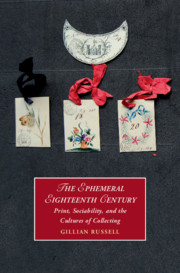Book contents
- The Ephemeral Eighteenth Century
- Cambridge Studies in Romanticism
- The Ephemeral Eighteenth Century
- Copyright page
- Dedication
- Contents
- Figures
- Acknowledgements
- Introduction
- Chapter 1 Accidental Readings and Diurnal Historiographies
- Chapter 2 Making Collections
- Chapter 3 The Natural History of Sociability
- Chapter 4 Sarah Sophia Banks’s ‘Magic Encyclopedia’
- Chapter 5 ‘Announcing Each Day the Performances’
- Chapter 6 Transacting Hospitality
- Chapter 7 England in 1814
- Conclusion
- Bibliography
- Index
- Cambridge Studies in Romanticism
Chapter 5 - ‘Announcing Each Day the Performances’
Playbills as Theatre/Media History
Published online by Cambridge University Press: 13 August 2020
- The Ephemeral Eighteenth Century
- Cambridge Studies in Romanticism
- The Ephemeral Eighteenth Century
- Copyright page
- Dedication
- Contents
- Figures
- Acknowledgements
- Introduction
- Chapter 1 Accidental Readings and Diurnal Historiographies
- Chapter 2 Making Collections
- Chapter 3 The Natural History of Sociability
- Chapter 4 Sarah Sophia Banks’s ‘Magic Encyclopedia’
- Chapter 5 ‘Announcing Each Day the Performances’
- Chapter 6 Transacting Hospitality
- Chapter 7 England in 1814
- Conclusion
- Bibliography
- Index
- Cambridge Studies in Romanticism
Summary
Chapter 5 examines the importance of the playbill in general in Romantic-period culture. Playbills represent by far the largest body of ephemeral texts that have survived and this chapter explores the history of their interest to collectors and how the theatre, as part of the category of ‘public amusements’, was integrated into ephemera collecting as a whole. The history of the playbill also focuses a discussion of changes in printing technology around 1800 – mainly the introduction of larger typefaces that could be read from a distance – which led to the emergence of the poster and the increasing colonisation of urban space by print. I argue for the importance of ephemera and ephemerality to Romantic-period media history and also to the genealogy of theatre history as a discipline. The chapter concludes with a discussion of the earliest printed document in Australian history to be discovered to date, a playbill for a performance of the tragedy Jane Shore at the ‘Theatre, Sydney’ in 1796.
Keywords
- Type
- Chapter
- Information
- The Ephemeral Eighteenth CenturyPrint, Sociability, and the Cultures of Collecting, pp. 153 - 185Publisher: Cambridge University PressPrint publication year: 2020

